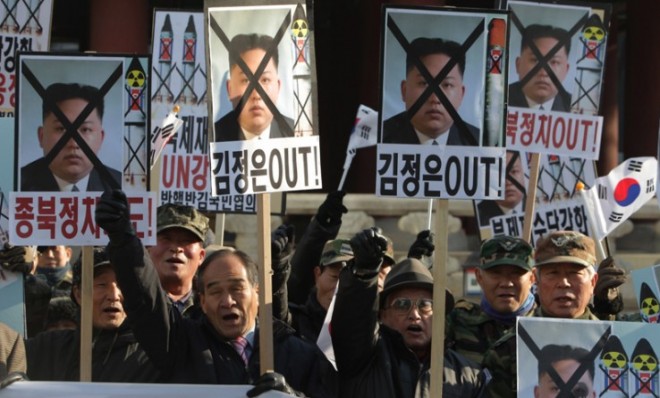North Korea's rocket launch: 3 consequences
Pyongyang defies threats of new sanctions and says it has successfully sent a satellite into orbit. What now?


The U.S., Japan, and South Korea are demanding new sanctions against North Korea after the communist nation carried out an apparently successful launch of a four-stage Unha-3 long-range rocket on Wednesday, in defiance of a United Nations Security Council ban against missile tests. The move was seen as a boost to Pyongyang's young leader, Kim Jong Un, who is trying to establish himself as a strong and worthy successor to his father, the late Kim Jong Il. The rocket carried a satellite, not warheads, but if North Korea did manage to place the satellite in orbit, as its state media claims, Pyongyang has taken a big step closer to developing an intercontinental ballistic missile capable of hitting the U.S. with a nuclear warhead. The Wednesday success also marks a significant turnaround for Kim, whose regime was embarrassed eight months ago when another Unha-3 rocket broke apart 90 seconds after launch. What will Pyongyang's apparent triumph mean for North Korea, its neighbors, and the U.S.? Here, three potential consequences:
1. The world may unite behind tougher sanctions
It's pretty clear where this is going, says Heo Seung-ha at South Korea's Arirang News. "The United Nations Security Council is expected to convene an emergency meeting" on Wednesday to discuss calls for stronger punitive measures than the ones South Korea demanded after the April missile shot. Even China, "the North's long-time ally," has expressed its displeasure over the launch, after having urged Pyongyang to call it off. The "veto-wielding, permanent member of the Security Council... was not on board with the idea of further restricting the North's finances" eight months ago, but that could change now. Don't get your hopes up, Bruce Klingner, a Korea expert at the Heritage Foundation, tells The Huffington Post. China has consistently blocked tighter sanctions before, saying Pyongyang had the right to launch peaceful space missions. We'll soon find out whether Beijing's "new leadership is any different than its predecessors."
The Week
Escape your echo chamber. Get the facts behind the news, plus analysis from multiple perspectives.

Sign up for The Week's Free Newsletters
From our morning news briefing to a weekly Good News Newsletter, get the best of The Week delivered directly to your inbox.
From our morning news briefing to a weekly Good News Newsletter, get the best of The Week delivered directly to your inbox.
2. Pyongyang may grow even bolder and more defiant
"Eight months ago, the international community stifled a snigger when North Korea's hyped rocket launch ended with a fizzle," says Hilary Whiteman at CNN. "No one is laughing now." The untested Kim Jong Un's regime "surprised just about everyone by actually admitting its failure" in the last launch, something Pyongyang never would have done under the young leader's father, the late Kim Jong Il. Now, though, expect North Korea to be even more vocal about its apparent triumph. In the short run, analysts say, we should brace for another nuclear test and further signs of belligerence from the Hermit Kingdom.
3. Obama may have to topple Kim — not merely tame him
"It is a familiar ritual when despotic regimes give way to a young ruler — hope for reform, followed by disappointment," says Jack David at The Wall Street Journal. After the Western-educated Kim Jong Un took over last year, some observers hoped that North Korea "could be induced to abandon its pursuit of nuclear weapons and long-range missiles through some combination of carrots (oil, food, etc.) and sticks (United Nations sanctions, prohibitions, etc.)." That hasn't worked. It's time for the Obama administration and its allies to start working on bring about "the regime's collapse, not to extract the next promise that Pyongyang can renege on."
A free daily email with the biggest news stories of the day – and the best features from TheWeek.com
Harold Maass is a contributing editor at The Week. He has been writing for The Week since the 2001 debut of the U.S. print edition and served as editor of TheWeek.com when it launched in 2008. Harold started his career as a newspaper reporter in South Florida and Haiti. He has previously worked for a variety of news outlets, including The Miami Herald, ABC News and Fox News, and for several years wrote a daily roundup of financial news for The Week and Yahoo Finance.
-
 Europe’s apples are peppered with toxic pesticides
Europe’s apples are peppered with toxic pesticidesUnder the Radar Campaign groups say existing EU regulations don’t account for risk of ‘cocktail effect’
-
 Political cartoons for February 1
Political cartoons for February 1Cartoons Sunday's political cartoons include Tom Homan's offer, the Fox News filter, and more
-
 Will SpaceX, OpenAI and Anthropic make 2026 the year of mega tech listings?
Will SpaceX, OpenAI and Anthropic make 2026 the year of mega tech listings?In Depth SpaceX float may come as soon as this year, and would be the largest IPO in history
